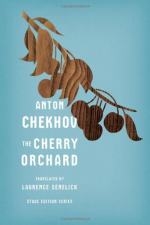|
This section contains 311 words (approx. 1 page at 400 words per page) |

|
The Cherry Orchard Summary & Study Guide Description
The Cherry Orchard Summary & Study Guide includes comprehensive information and analysis to help you understand the book. This study guide contains the following sections:
This detailed literature summary also contains Bibliography and a Free Quiz on The Cherry Orchard by Anton Chekhov.
Anton Chekhov wrote The Cherry Orchard during the last year of his life. Though Chekhov intended the play to be a comedy, when it was first produced by the Moscow Art Theater on January 17, 1904, producer Konstantin Stanislavsky insisted it should be played as a tragedy. Chekhov fought against this portrayal, but to this day, most productions emphasize the tragic elements of the piece.
The Cherry Orchard is a play about the passing of an era. Some critics have said that it is a play about nothing more than a wealthy family that loses its beloved cherry orchard and estate to a man of the rising middle class. The action is quiet in this tragicomedy. Chekhov's family had lost its home to repossession in 1876, and this may have been an inspiration for the story. He also had inspiration for some of the characters while staying at the estate owned by Stanislavsky's mother in 1902.
The Cherry Orchard portrays the social climate of Russia at the beginning of the 20th century, when the aristocrats and land-owning gentry were losing their wealth and revealed themselves to be incapable of coping with their change in status. Many Socialist Soviet critics in Russia after the Revolution of 1917 tried to interpret this as an indictment of Russian society at the turn of the century; however, it is unlikely that Chekhov meant this play as an attack on the society of which he was so much a part. Though intended as a comedy, the tragedy of the situation in which Mrs. Ranevsky and her family find themselves is derived primarily from their inability to adapt to their new social and personal responsibilities. No longer able to live on the labor provided by the serfs (slaves) who worked the land, many wealthy landowners, like Mrs. Ranevsky in The Cherry Orchard, lost their fortunes and their estates.
Read more from the Study Guide
|
This section contains 311 words (approx. 1 page at 400 words per page) |

|



